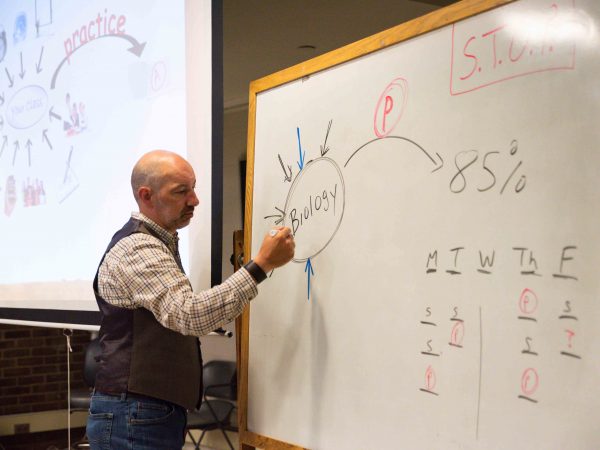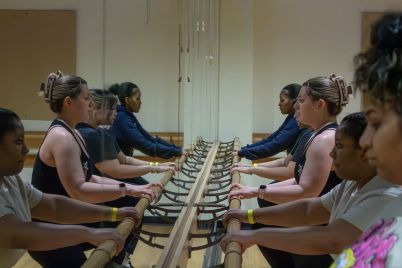
Biology faculty member David Wooten lectures on S.T.O.P., a formula designed to help students study more effciently. Lily Merritt | Washtenaw Voice
By Brian Babcock
Staff Writer
Congratulations to all who made it through their first two weeks of college — this is only the beginning.
For most students, the first week is usually the easiest. Classes mostly consist of going over the syllabus, getting to know each other and other “fluff” activities. The second week tends to ramp it up a bit. By week four, most students feel the pressure of taking their first exams.
It can be intimidating not knowing how the professor writes exams or what to expect, in general.
Fortunately, it doesn’t have to be this stressful. Students need to S.T.O.P. stressing and look to Studying, Time management, Organization, and Practice. Following this simple formula, created by biology faculty member David Wooten, can aid in earning a higher GPA and gaining more free time.
“Those four fundamental concepts need to be there to be successful in almost any course in college — regardless of topic . . . from biology to poetry,” Wooten said.
Studying
How does one study? There really is no set way. People are different, and they learn in different ways.
“The majority of the receptors in our body are in your retina,” said Wooten. “We are a visual species, so seeing something is different than talking about it.”
For example, drawing pictures or diagrams on flashcards for an anatomy and physiology class might come in handy. There is no cookie-cutter design. Many prefer group studying or reviewing notes alone in a quiet study space. Wooten advocates for students doing what suits them best, as long as practice is factored in afterward.
Time management and organization
Wooten provides a good analogy of what being organized can do for students.
“It’s like that junk drawer . . . you can throw everything in there and dig around to find whatever, if you keep at it, but you can also take that same drawer and organize it in a different way . . . it just becomes more efficient,” he said.
Many students purchase planners to help organize each week. This can significantly help students to cut out study times.
Practice
Remember the old saying “practice means perfect?” Well, it couldn’t be any closer to the truth. Practice helps, period.
“Practice is any exercise where you don’t have the answer in front of you,” Wooten said. “It’s where you’re being forced to produce the response . . . not reading your notes, not reading the book for the answer, and not watching a video where someone else is telling you the answer. It’s a blank sheet of paper.”
That’s not to say that students shouldn’t read the book or look over notes, which is important to do early-on in order to better understand the material.
Wooten recommends a 3:1 ratio when it comes to reviewing material and then practicing. This means that for every three half-hour review blocks, there is one half-hour block of practice at the end.
“Push yourself . . . institute those practice exercises . . .they’re uncomfortable, they can be painstaking at times [but] that blank piece of paper is your best friend. It’ll stare back at you for hours until you say something intelligent, but it will let you know, without damaging your grade, whether you’re ready or not to take that next evaluation,” Wooten said.


